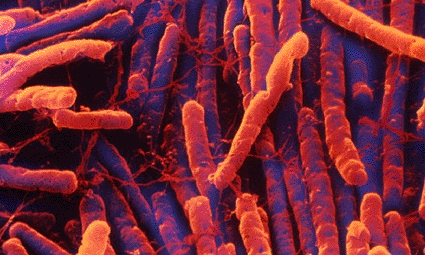Monoclonal Antibody Treatment Reduces Recurrence of C. Difficile Infection
By LabMedica International staff writers
Posted on 01 Feb 2010
A cocktail that combines antibiotics and two monoclonal antibodies has been shown to reduce recurrence of infection by Clostridium difficile by more than 70%.Posted on 01 Feb 2010
C. difficile is the most serious cause of antibiotic-associated diarrhea (AAD) and can lead to pseudomembranous colitis, a severe infection of the colon, often resulting from eradication of the normal gut flora by antibiotics. The C. difficile bacteria, which are part of the normal flora, become overpopulated. This overpopulation is harmful because the bacteria release toxins (A (CDA1) and B (CDB1)) that can cause bloating, constipation, and diarrhea with abdominal pain, which may become severe. C. difficile is most common among hospitalized patients and residents of long-term care facilities. Lately, the emergence of an epidemic strain has been implicated in severe outbreaks in the United States, Canada, and the United Kingdom, where it has affected otherwise healthy individuals.

Image: Colored scanning electron micrograph (SEM) of C. difficile bacteria (Photo courtesy of D. Phillips / SPL).
Investigators at MassBiologics (Boston, MA, USA) and Medarex (Princeton, NJ, USA) collaborated to develop fully humanized monoclonal antibodies directed at the two C. difficile toxins. Humanized monoclonal antibodies are produced in genetically engineered mice. These transgenic mice contain a large portion of human DNA encoding the antibody heavy and light chains. Inactivation of the mice's own heavy- and light-chain genes forces the mice to use the human genes to make antibodies.
A paper in the January 21, 2010, issue of the New England Journal of Medicine (NEJM) presented results of a Phase 2 study conducted to evaluate the efficacy of treatment with two neutralizing, fully human monoclonal antibodies against CDA1 and CDB1.
The investigators performed a randomized, double blind, placebo-controlled study where the antibodies or placebo were administered together as a single infusion to 200 patients with symptomatic C. difficile infection who were receiving either metronidazole or vancomycin. The primary outcome was laboratory-documented recurrence of infection during the 84 days after the administration of monoclonal antibodies or placebo.
The results revealed that while only 7% of the patients who received the antibodies suffered a recurrence, 25% of those who received the placebo did so - a 72% reduction in recurrence. A second experimental group of 44 patients were infected with the epidemic strain of C. difficile. Of this group only 8% who received the antibodies suffered a recurrence compared with 32% of those who received the placebo.
"We are pleased that this new treatment had such a significant impact for these patients," said senior author Dr. Donna Ambrosino, executive director of MassBiologics. "This disease is a growing public health problem and the need for effective treatment options is quite clear. The team at MassBiologics is gratified that we have been able to discover effective antibodies, and then translate the discovery to a product with the collaboration of our colleagues at Medarex."
Related Links:
MassBiologics
Medarex













